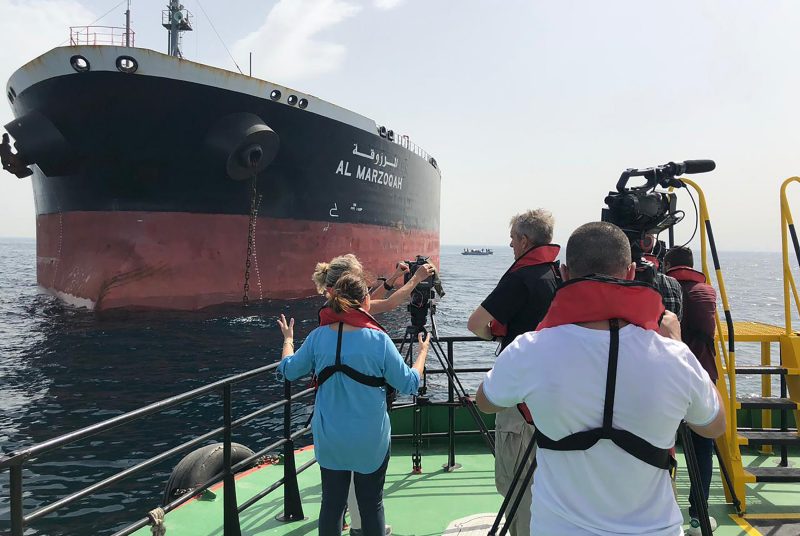Oil tankers hit by ‘sabotage attacks’ as Gulf tensions soar
Saudi Arabia said two of its oil tankers, including the Al-Marzoqah pictured here, suffered significant damage in sabotage attacks
(HANDOUT)
Fujairah (United Arab Emirates) (AFP) – Four ships, including two Saudi oil tankers, were damaged in mysterious “sabotage attacks” that further inflamed Gulf tensions on Monday amid a standoff between the United States and Iran.
In the face of growing international concern, US Secretary of State Mike Pompeo scrapped a planned visit to Moscow to head to Brussels instead for talks with European officials on Iran.
Tehran called for an investigation into Sunday’s “alarming” attacks off the Emirati coast and warned of “adventurism” by foreign players to disrupt maritime security.
Britain warned of the danger of conflict erupting “by accident” in the Gulf.
The US has already strengthened its military presence in the region, including deploying a number of strategic B-52 bombers in response to alleged Iranian threats.
Saudi Arabia, the Islamic republic’s regional arch-rival, condemned “the acts of sabotage which targeted commercial and civilian vessels near the territorial waters of the United Arab Emirates”, a foreign ministry source said.
“This criminal act constitutes a serious threat to the security and safety of maritime navigation and adversely impacts regional and international peace and security,” the source added.
A UAE government official said the Saudi oil tankers Al-Marzoqah and Amjad were attacked off the emirate of Fujairah along with the Norwegian tanker Andrea Victory and an Emirati ship, the A. Michel.
The Andrea Victory’s managers, Thome Group, said the tanker had a hole in the hull area “after being struck by an unknown object on the waterline”.
The crew were unharmed and the ship was not in any danger of sinking, it said.
Saudi Energy Minister Khalid al-Falih said the kingdom’s two tankers suffered “significant damage” but there were no casualties or any oil spill.
Neither Saudi Arabia nor the UAE gave details on the nature of the attacks or accused anyone of responsibility.
The UAE minister of state for foreign affairs, Anwar Gargash, said the Emirates would probe the “deliberate sabotage” of the ships.
Fujairah port is the only Emirati terminal located on the Arabian Sea coast, bypassing the Strait of Hormuz, through which most Gulf oil exports pass.
Iran has repeatedly threatened to close the strait in case of a military confrontation with the United States.
“If, and it’s an ‘IF’, there really has been a deliberate attempt to damage these oil tankers, then it’s possibly a warning from Iran about the consequences of anybody taking military action against Iranian targets anywhere in the region,” said Middle East analyst Neil Partrick.
Oil prices rose on world markets on Monday with benchmark Brent North Sea crude up 1.6 percent at $71.74 a barrel in London.
– ‘Serious development’ –
Iranian foreign ministry spokesman Abbas Mousavi expressed concern over the incidents which he called “alarming and regrettable”.
He “warned against plots by ill-wishers to disrupt regional security” and “called for the vigilance of regional states in the face of any adventurism by foreign elements”, a statement said.
Almost all the oil exports of Saudi Arabia, Iraq, UAE, Kuwait, Qatar and Iran itself, at least 15 million barrels per day, are shipped through the Strait of Hormuz.
The Saudi minister denounced the attack on the vessels, saying it “aims to undermine the freedom of maritime navigation and the security of oil supplies to consumers all over the world.”
The UAE had earlier categorically denied reports on social media of massive explosions in oil tankers off the coast of Fujairah, whose port on Monday was calm with no signs of damage.
Karen Young, a resident scholar at the Washington-based American Enterprise Institute think tank, said the incidents were “clearly… more than a one off attack, but something more coordinated.”
“Tensions are high and have been escalated by the US as well. We have to be wary of tit for tat provocations, and those that may be misinterpreted or even false flag actions,” she told AFP.
– ‘Criminal acts’ –
The six-nation Gulf Cooperation Council — which includes Saudi Arabia and the UAE — as well as the Arab League condemned Sunday’s incident.
“This is a dangerous escalation representing evil intentions by those that planned and executed this operation,” said GCC secretary general Abdullatif al-Zayani.
Arab League chief Ahmed Aboul Gheit said the “criminal acts were a dangerous violation of the freedom and safety of trade”.
British foreign minister Jeremy Hunt called for “a period of calm”.
“We are very worried about the risk of a conflict happening by accident with an escalation that is unintended on either side but ends with some kind of conflict,” he said as he arrived for a meeting of EU foreign ministers in Brussels.
German Foreign Minister Heiko Maas said he used a one-on-one meeting with Pompeo to stress that “we are concerned about the development and the tensions in the region, that we do not want there to be a military escalation”.
Shiite-majority Iran rivals Sunni-ruled Saudi Arabia for influence in the Middle East, with the two taking opposing sides in multiple regional conflicts including in Yemen.
Last year, Saudi Arabia temporarily suspended oil shipments through the Bab al-Mandab strait — a vital shipping route between the Arabian Peninsula and the Horn of Africa — after two of its ships were attacked by Iran-aligned Yemeni rebels.
The increasing tensions come after Tehran said Wednesday it had stopped respecting limits on its nuclear activities agreed under a 2015 deal that has since been abandoned by Washington.
Disclaimer: Validity of the above story is for 7 Days from original date of publishing. Source: AFP.


